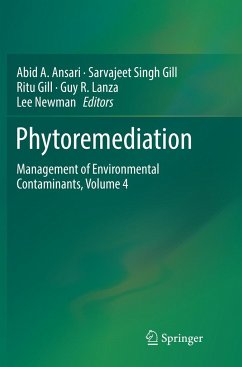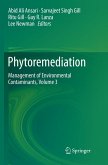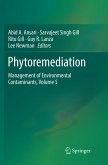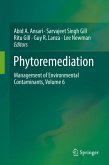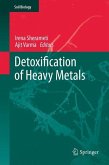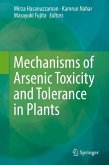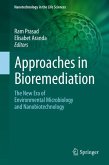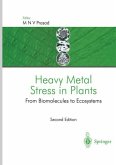Phytoremediation
Management of Environmental Contaminants, Volume 4
Herausgegeben:Ansari, Abid A.; Gill, Sarvajeet Singh; Gill, Ritu; Lanza, Guy R.; Newman, Lee
Phytoremediation
Management of Environmental Contaminants, Volume 4
Herausgegeben:Ansari, Abid A.; Gill, Sarvajeet Singh; Gill, Ritu; Lanza, Guy R.; Newman, Lee
- Broschiertes Buch
- Merkliste
- Auf die Merkliste
- Bewerten Bewerten
- Teilen
- Produkt teilen
- Produkterinnerung
- Produkterinnerung
This text details the plant-assisted remediation method, "phytoremediation," which involves the interaction of plant roots and associated rhizospheric microorganisms for the remediation of soil contaminated with high levels of metals, pesticides, solvents, radionuclides, explosives, crude oil, organic compounds and various other contaminants. Each chapter highlights and compares the beneficial and economical alternatives of phytoremediation to currently practiced soil removal and burial practices.
Andere Kunden interessierten sich auch für
![Phytoremediation Phytoremediation]() Phytoremediation149,99 €
Phytoremediation149,99 €![Phytoremediation Phytoremediation]() Phytoremediation149,99 €
Phytoremediation149,99 €![Phytoremediation Phytoremediation]() Phytoremediation223,99 €
Phytoremediation223,99 €![Detoxification of Heavy Metals Detoxification of Heavy Metals]() Detoxification of Heavy Metals149,99 €
Detoxification of Heavy Metals149,99 €![Mechanisms of Arsenic Toxicity and Tolerance in Plants Mechanisms of Arsenic Toxicity and Tolerance in Plants]() Mechanisms of Arsenic Toxicity and Tolerance in Plants149,99 €
Mechanisms of Arsenic Toxicity and Tolerance in Plants149,99 €![Approaches in Bioremediation Approaches in Bioremediation]() Approaches in Bioremediation134,99 €
Approaches in Bioremediation134,99 €![Heavy Metal Stress in Plants Heavy Metal Stress in Plants]() Heavy Metal Stress in Plants149,99 €
Heavy Metal Stress in Plants149,99 €-
-
-
This text details the plant-assisted remediation method, "phytoremediation," which involves the interaction of plant roots and associated rhizospheric microorganisms for the remediation of soil contaminated with high levels of metals, pesticides, solvents, radionuclides, explosives, crude oil, organic compounds and various other contaminants. Each chapter highlights and compares the beneficial and economical alternatives of phytoremediation to currently practiced soil removal and burial practices.
Produktdetails
- Produktdetails
- Verlag: Springer / Springer International Publishing / Springer, Berlin
- Artikelnr. des Verlages: 978-3-319-82436-9
- Softcover reprint of the original 1st ed. 2016
- Seitenzahl: 428
- Erscheinungstermin: 7. Juli 2018
- Englisch
- Abmessung: 235mm x 155mm x 24mm
- Gewicht: 652g
- ISBN-13: 9783319824369
- ISBN-10: 3319824368
- Artikelnr.: 53570157
- Herstellerkennzeichnung
- Springer Nature c/o IBS
- Benzstrasse 21
- 48619 Heek
- Tanja.Keller@springer.com
- Verlag: Springer / Springer International Publishing / Springer, Berlin
- Artikelnr. des Verlages: 978-3-319-82436-9
- Softcover reprint of the original 1st ed. 2016
- Seitenzahl: 428
- Erscheinungstermin: 7. Juli 2018
- Englisch
- Abmessung: 235mm x 155mm x 24mm
- Gewicht: 652g
- ISBN-13: 9783319824369
- ISBN-10: 3319824368
- Artikelnr.: 53570157
- Herstellerkennzeichnung
- Springer Nature c/o IBS
- Benzstrasse 21
- 48619 Heek
- Tanja.Keller@springer.com
Dr. Abid A Ansari, M.Sc., Ph.DDepartment of Biology, University of TabukTabuk, Kingdom of Saudi Arabia Dr. Sarvajeet Singh Gill, M.Sc. (Gold medal), M.Phil., Ph.D Dr. Ritu Gill, Ph.DStress Physiology and Molecular Biology Lab, Centre for Biotechnology,MD University, Rohtak 124 001, Haryana, India Dr. Guy R. Lanza, Ph.D.College of Environmental Science and ForestryState University of New York (SUNY)Syracuse, NY 13210-2778USA Dr. Lee Newman, Ph.DCollege of Environmental Science and ForestryState University of New York (SUNY) Syracuse, NY 13210-2778USA
Section 1. Phytoremediation of Organic Contaminants.- Phytoremediation of PCBs and PAHs by Grasses: A Critical Perspective.- Organic Soil Amendments in the Phytoremediation Process.- Phytoremediation of Crude Oil Contaminated Soil using Cynodon dactylon (L.) Pers).- A Study on Degradation of Heavy Metals in Crude Oil Contaminated Soil using Cyperus rotundus.- Polycyclic Aromatic Hydrocarbons and Heavy Metal Contaminated Sites: Phytoremediation as a Strategy for Addressing the Complexity of Pollution.- Phytoremediation of Polycyclic Aromatic Hydrocarbons (PAHs) in Urban Atmospheric Deposition Using Bio-retention Systems.- Section 2. Wastewater Engineering and Technology.- Plant Growth Promoting Bacteria: A Good Source for Phytoremediation of Metals Contaminated Soil.- Biotechnological Approaches to Remediate Soil and Water using Plant-Microbe Interactions.- Current and Future Opportunities for Forest Land Application Systems of Wastewater.- Bio-retention Systems for Storm water Treatment and Management in Urban Systems.- Fungal Laccase Enzyme Applications in Bioremediation of Polluted Wastewater.- Section 3. Natural and Constructed Wetlands for Phytoremediation.- Phytoremediation Applications for Waste Water and Improved Water Quality.- Plants for Constructed Wetlands as an Ecological Engineering Alternative to Road Runoff Desalination.- Constructed Wetlands for Livestock Wastewater Treatment: Antibiotics Removal and Effects on CWs Performance.- Phytoremediation Potential of Selected Mangrove Plants for Trace Metal Contamination in Indian Sundarban Wetland.- Fate of Phenolic Compounds in Constructed Wetlands Treating Contaminated Water.- Removal of Pathogenic Bacteria in Constructed Wetlands: Mechanisms and Efficiency.- Section 4. Phytoremediation for Reclamation and Restoration.- Low-Tech Alternatives for the Rehabilitation of Aquatic and Riparian Environments.- Proposed Rehabilitation Method of Uncontrolled Landfills in Insular CommunitiesThrough Multi CriteriaAnalysis Decision Tool.- Suitability of Different Mediterranean Plants for Phytoremediation of Mine Soils Affected with Cadmium.
Section 1. Phytoremediation of Organic Contaminants.- Phytoremediation of PCBs and PAHs by Grasses: A Critical Perspective.- Organic Soil Amendments in the Phytoremediation Process.- Phytoremediation of Crude Oil Contaminated Soil using Cynodon dactylon (L.) Pers).- A Study on Degradation of Heavy Metals in Crude Oil Contaminated Soil using Cyperus rotundus.- Polycyclic Aromatic Hydrocarbons and Heavy Metal Contaminated Sites: Phytoremediation as a Strategy for Addressing the Complexity of Pollution.- Phytoremediation of Polycyclic Aromatic Hydrocarbons (PAHs) in Urban Atmospheric Deposition Using Bio-retention Systems.- Section 2. Wastewater Engineering and Technology.- Plant Growth Promoting Bacteria: A Good Source for Phytoremediation of Metals Contaminated Soil.- Biotechnological Approaches to Remediate Soil and Water using Plant-Microbe Interactions.- Current and Future Opportunities for Forest Land Application Systems of Wastewater.- Bio-retention Systems for Storm water Treatment and Management in Urban Systems.- Fungal Laccase Enzyme Applications in Bioremediation of Polluted Wastewater.- Section 3. Natural and Constructed Wetlands for Phytoremediation.- Phytoremediation Applications for Waste Water and Improved Water Quality.- Plants for Constructed Wetlands as an Ecological Engineering Alternative to Road Runoff Desalination.- Constructed Wetlands for Livestock Wastewater Treatment: Antibiotics Removal and Effects on CWs Performance.- Phytoremediation Potential of Selected Mangrove Plants for Trace Metal Contamination in Indian Sundarban Wetland.- Fate of Phenolic Compounds in Constructed Wetlands Treating Contaminated Water.- Removal of Pathogenic Bacteria in Constructed Wetlands: Mechanisms and Efficiency.- Section 4. Phytoremediation for Reclamation and Restoration.- Low-Tech Alternatives for the Rehabilitation of Aquatic and Riparian Environments.- Proposed Rehabilitation Method of Uncontrolled Landfills in Insular CommunitiesThrough Multi CriteriaAnalysis Decision Tool.- Suitability of Different Mediterranean Plants for Phytoremediation of Mine Soils Affected with Cadmium.

